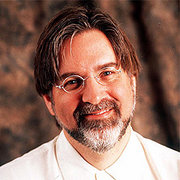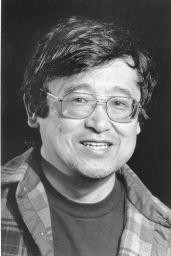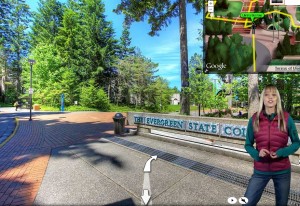In an article in the South Sound Green Pages, Member of the Faculty Zoltan Grossman explores how the Port of Olympia supplies fracking operations on Great Plains tribal lands.
Author Archives: Dante Garcia
The Olympian Interviews Lauren O’Neill ’02 About New Role

“I’m there to balance the money and the magic,” says Lauren O’Neill ’02 of her new role as Managing Director at Capital Playhouse.
The Olympian published an interview this week with Lauren O’Neill ’02 about her recent appointment as Managing Director at Capital Playhouse.
Photo of the Week 12.1.12
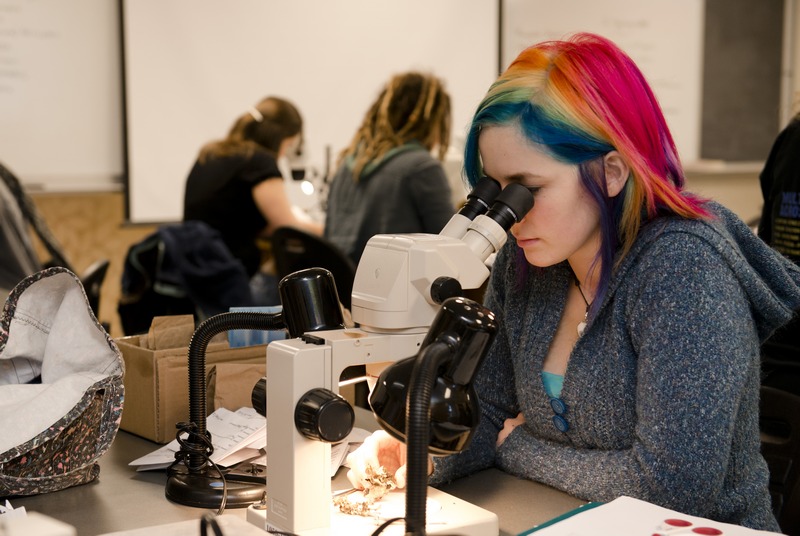
The task? Study and classify 40 different lichens and mushrooms for The Fungal Kingdom. Photo by Shauna Bittle
Writers Guild Honors Matt Groening ’77
The Animation World Network reports that the Writers Guild of America will award Matt Groening ’77 with its West Animation Writers Caucus’ 15th Annual Animation Writing Award.
Moonbeam Children’s Book Award honors Mikko Azul ’97
Mikko Azul’s latest book, Askari, earned a Bronze Moonbeam Children’s Book Award in Young Adult Fiction-Fantasy/Sci-Fi. The Moonbeam awards recognize stories that inspire and delight children of all ages. Askari is her first work of fantasy fiction and is written as the first in a trilogy called Child of Muralia.
Evergreen’s Authors Directory contains a listing of Mikko’s work, some reflections on how she navigated Evergreen’s curriculum and how she’s incorporated her Evergreen experience into her writing:
“Two of my professors at Evergreen have been immortalized in the print of my books: Mark Levinsky and Doranne Crable. Both had a tremendous impact on my outlook on life and were such interesting characters in and of themselves that I just couldn’t resist! Their names have been changed to protect their innocence.”
The Passing of David Whitener
Editor’s Note: Recently, Vice President for Academic Affairs, Michael Zimmerman sent the following note to the campus community about the death of David Whitener. Last week Indian Country Today also honored David in an article.
Friends,
It is with sadness that I share with you the recent passing of David Whitener, Sr. David was a member of the faculty at Evergreen for 18 years, ending with his retirement and the conferring of Faculty Emeritus status in 1996.
Upon his retirement, David was described as a “mainstay” in the Native American Studies program dedicated to teaching methods that best support Native American learners. David was also a catalyst for the Longhouse House of Welcome and is considered one of its pillars.
The Passing of Masoa Sugiyama
Editor’s Note: Recently, Loren Petty of the Masters in Teaching program sent the following note to the MIT alumni about the death of Masoa Sugiyama.
The faculty and staff of the MiT program are sad to inform you that Masao Sugiyama passed away last night. He sustained significant brain injuries last week as a result of a fall. Throughout his time in the hospital, Masao was surrounded by family and friends who loved and supported him.
We will miss him dearly! We are deeply grateful for the compassion and support he always offered you, his students. He was your constant and vocal advocate, frequently telling us that you were the best teachers in the state. We will remember Masao for his deep commitment to equity, his humor, and his honesty.
The Mendoza-Sugiyama family thanks you for your loving thoughts at this time.Best wishes to all of you,
Loren E. Petty
Readers: Do you have fond memories of Masao? Share your thoughts by commenting and we will pass the comments on to Loren and Sherry for possible inclusion in the newsletter.
Christina Meister ’13 Lands Coveted White House Internship
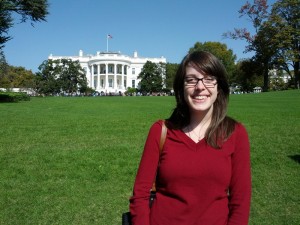
Christina Meister, Evergreen senior & Intern at the White House
This year Christina Meister, a senior at Evergreen, is jumping in the White House for a four month Internship Program. More than 5,000 students applied and only 165 were chosen. In the midst of her busy schedule, Christina answered our questions about this highly competitive internship.
Dante Garcia (DG): How did it feel to receive the internship? What was the first thing that you did after finding out?
Christina Meister (CM): It’s hard to describe the initial feelings I had when I was notified of my acceptance. Shock comes to mind but so does extreme excitement, happiness, relief, and honor. I think one of the first things I did was recheck the email, hug my roommates, jump around, and call my mother.
DG: How is it now that you are there? Who are you working with and what are they like?
CM: I feel so humbled and grateful to be here. I am a White House intern assigned to the Office of Digital Strategy, which is responsible for creating and developing content for official White House websites, mobile apps, email programs, and social media presences. I work with a very diverse group of people who are passionate about what they do.
DG: What are you looking forward to? What are you most excited about? What are you getting involved with?
CM: Each day is a new adventure. One of the things that I love about our office is that you never know what to expect and you are constantly learning new things. I know this may sound cliché, but I am just so excited to be here. This is an amazing time in history and I couldn’t have asked for a better experience.
Last year Alyssa McClure ’12 was the first Greener to be accepted for the White House Internship Program. You can find her story in the Evergreen Magazine, Fall 2012.
Readers: Did you have a memorable internship when you were a student? Did it help you in your career? Share your memories by commenting.
Vile villains and virtuous heroes? Greg Mullins on literature and human rights
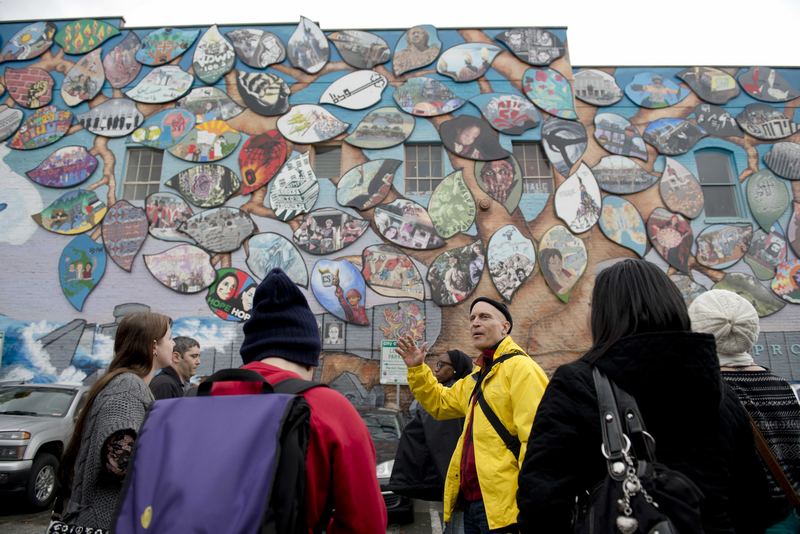
Member of the Faculty, Greg Mullins discusses the Olympia-Rafah Solidarity Mural with Evergreen students in downtown Olympia. Greg explores literature and human rights in his research and teaching. Photo taken by Shauna Bittle
Editor’s Note: We recently asked Greg Mullins, Member of the Faculty, to write a piece about his research into human rights and literature. He is the author of Colonial Affairs: Bowles, Burroughs, and Chester Write Tangier. Greg is currently working on a project called The Banality of Good: Cultures of Human Rights and teaching a program called Freedom Dreams: The Cultural Revolutions of the 1960’s.
Greg Mullins: When I first read John Milton’s Paradise Lost many years ago, I noted an irony much commented upon by literary scholars: as heroes go, Adam is anemic at best. Lucifer, the villain, has all the star power. In fact, many readers find him powerful and charismatic.
Ordinarily, wouldn’t we expect villains to be vile?
Over several years of teaching and writing about human rights and literature I’ve often thought about that irony. In a morality tale, the good guy wins and the narrative offers a moral lesson to the readers. But in a great deal of contemporary literature concerned with human rights violations, there is no simple moral to the story. Frequently, the text refuses closure, leaving the reader on her own to contemplate what to think upon finishing the book. Consider, for example, Coetzee, Waiting for the Barbarians, Ondaatje, Anil’s Ghost, or Danticat, The Dew Breaker.
Is it possible that reading literature concerned with human rights violations can nudge readers toward a better ethical and political understanding of why those violations happen, and what can be done to prevent them? I would argue that literature can serve that function. In fact, I argue that literature can provide a sort of antidote to the banalization of the language of human rights that we see all around us in political rallies, slogans, bumper stickers, fundraising appeals, and sound bites.
Not only does the act of reading literature force us to slow down and think, but the best of that literature challenges us to reevaluate what we think we know. A vile villain is easy to hate; a virtuous hero is easy to love. But why would we need to teach ourselves to think ethically if the world were as simple and unambiguous as a morality tale?
Readers: What’s your response to Greg’s questions? Can literature nudge us towards a better understanding of human rights violations?
New Virtual Tour of Campus
If you ever wanted to refer Evergreen to a friend, now it’s easier:
The Evergreen State College recently completed a new virtual tour of campus complete with 360 degree views, video footage, photographs, and a walking tour with a virtual guide.



